Module 3 On the radio>>Unit 3 Language in use
文档属性
| 名称 | Module 3 On the radio>>Unit 3 Language in use |
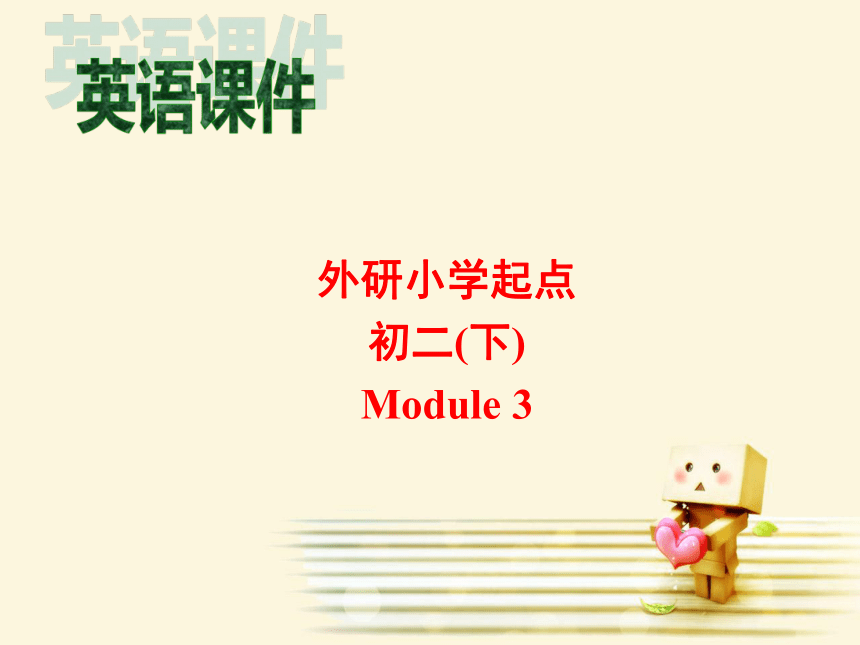
|
|
| 格式 | rar | ||
| 文件大小 | 427.8KB | ||
| 资源类型 | 教案 | ||
| 版本资源 | 外研版 | ||
| 科目 | 英语 | ||
| 更新时间 | 2012-02-12 00:00:00 | ||
图片预览

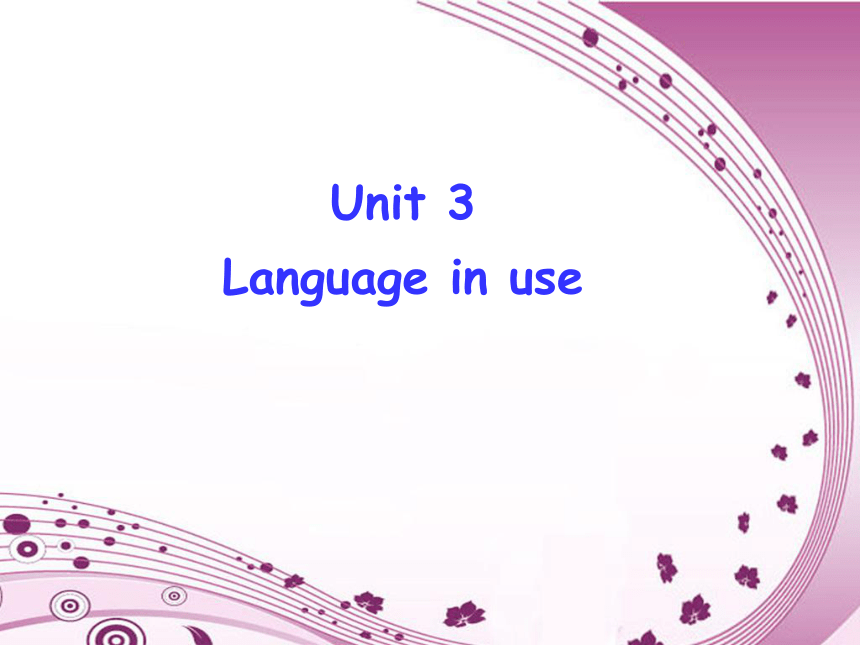
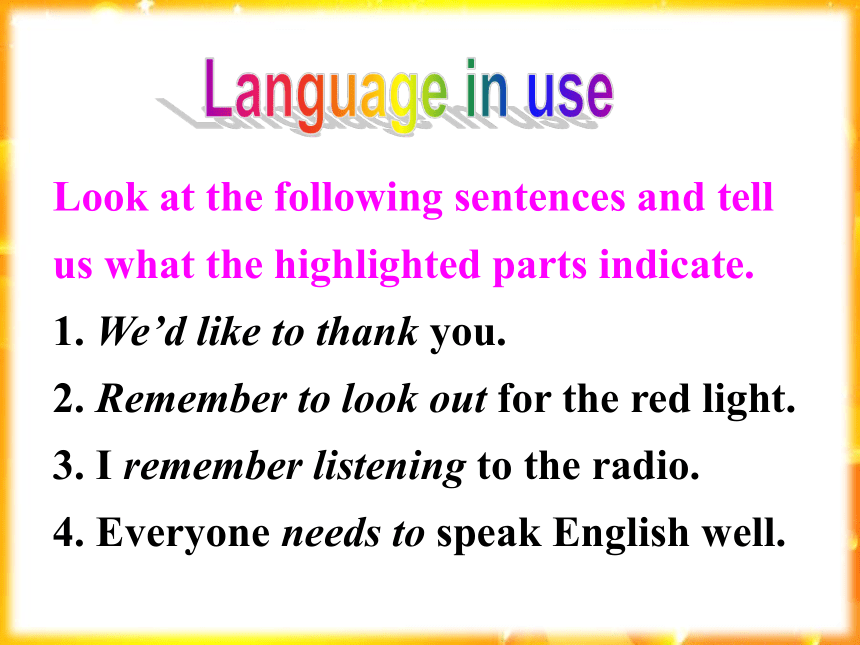
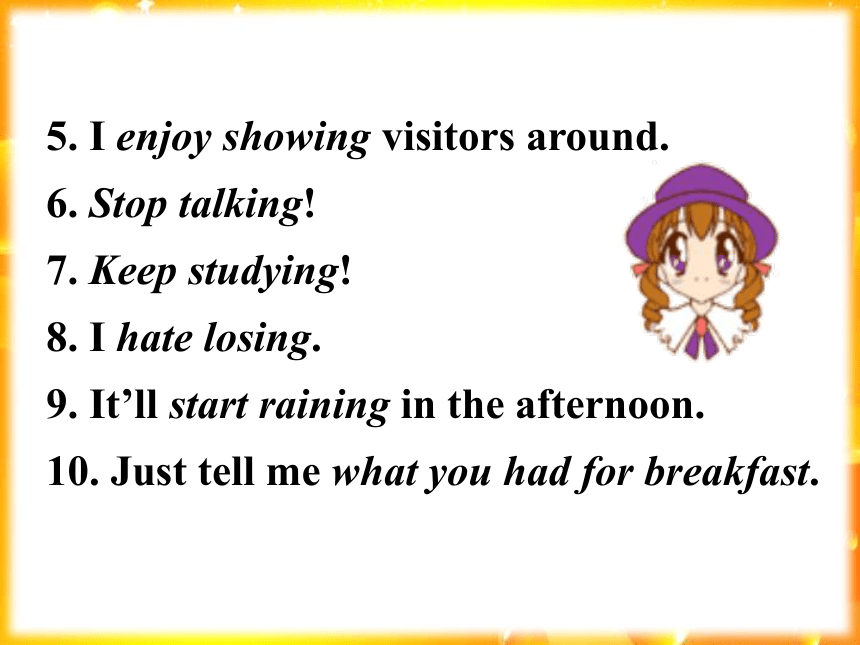
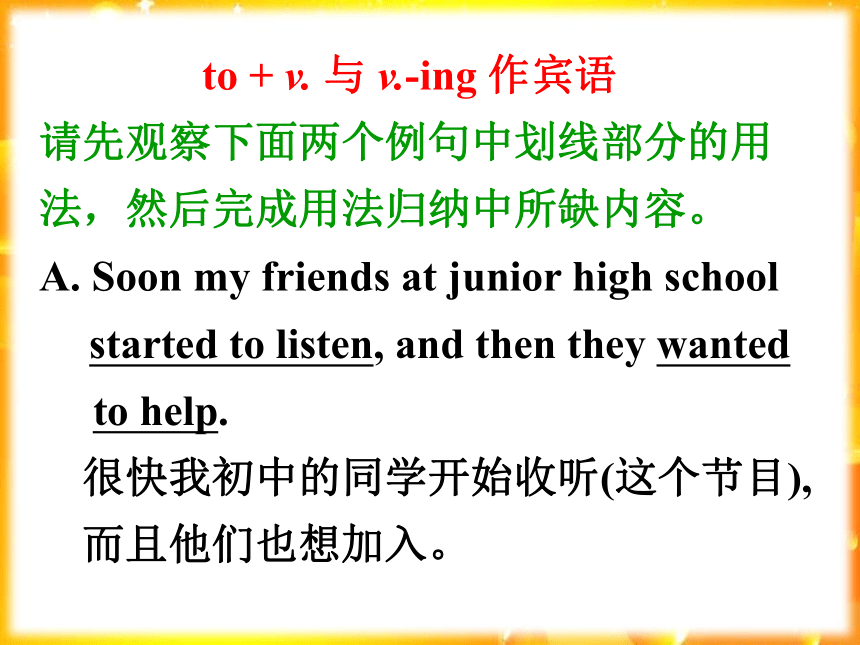
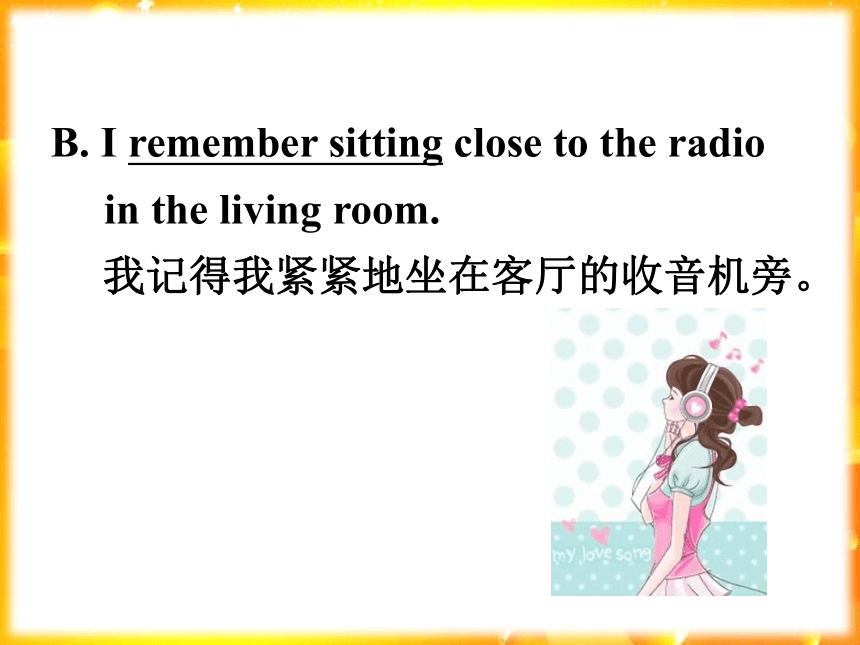

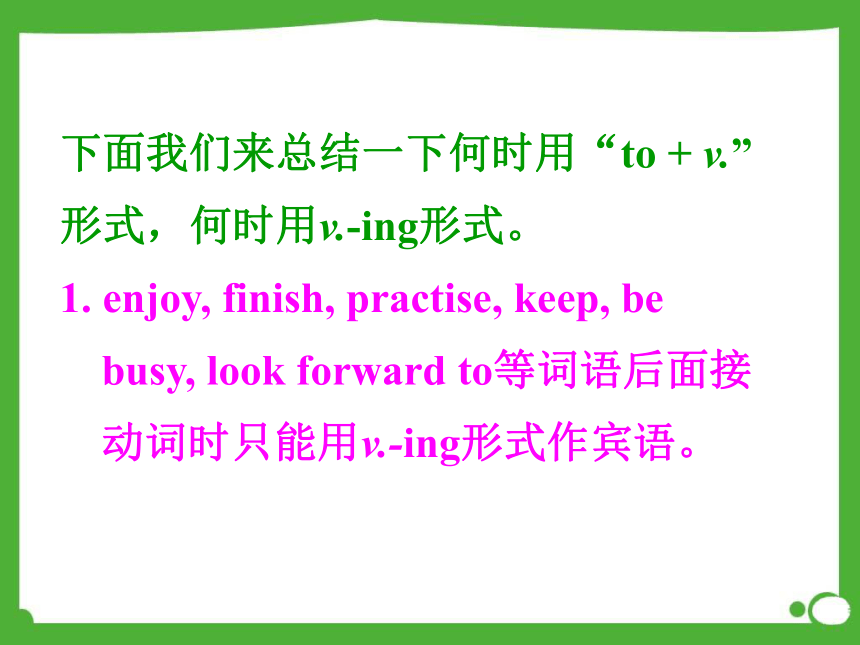

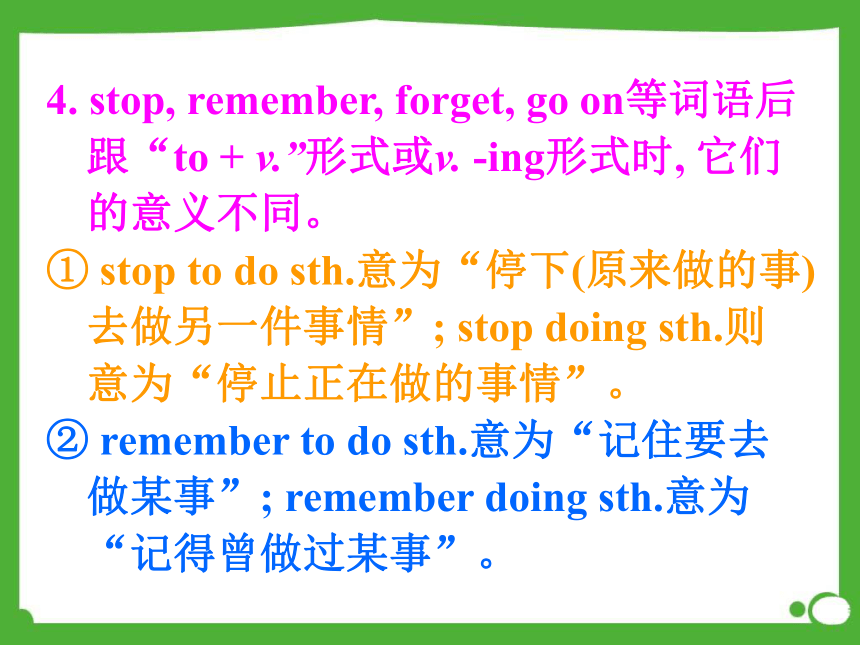
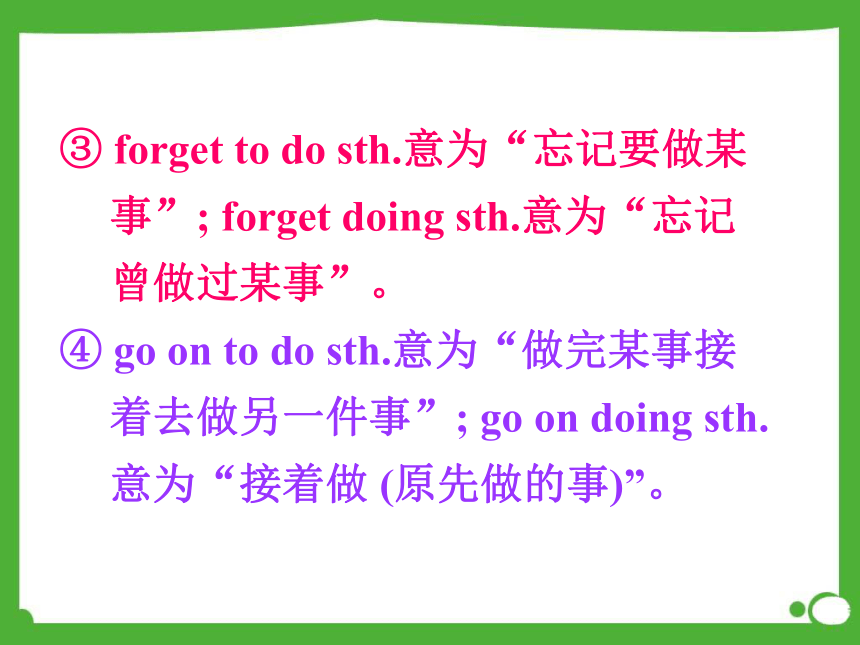
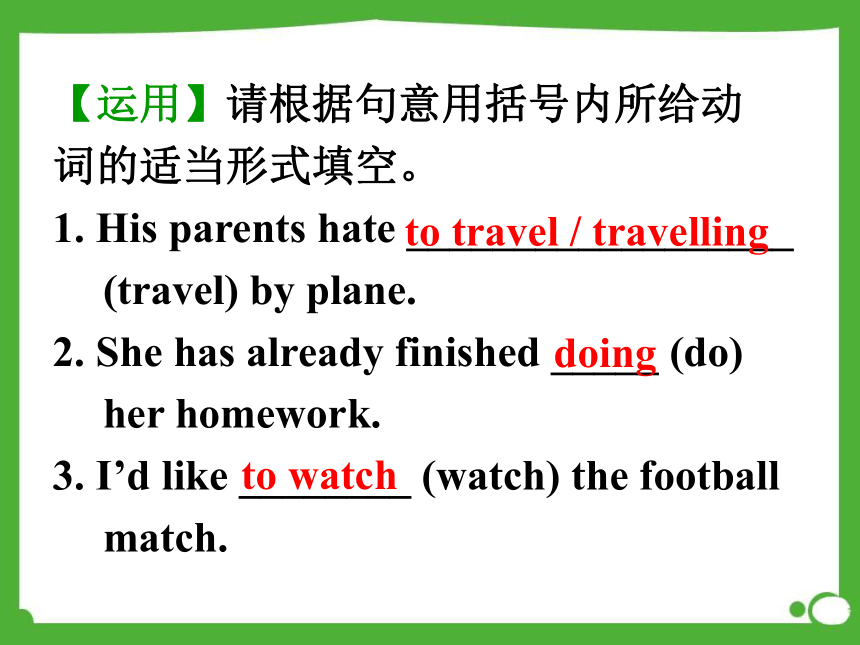
文档简介
(共32张PPT)
外研小学起点
初二(下)
Module 3
Unit 3
Language in use
Look at the following sentences and tell us what the highlighted parts indicate.
1. We’d like to thank you.
2. Remember to look out for the red light.
3. I remember listening to the radio.
4. Everyone needs to speak English well.
5. I enjoy showing visitors around.
6. Stop talking!
7. Keep studying!
8. I hate losing.
9. It’ll start raining in the afternoon.
10. Just tell me what you had for breakfast.
to + v. 与 v.-ing 作宾语
请先观察下面两个例句中划线部分的用法,然后完成用法归纳中所缺内容。
A. Soon my friends at junior high school started to listen, and then they wanted
to help.
很快我初中的同学开始收听(这个节目),
而且他们也想加入。
B. I remember sitting close to the radio
in the living room.
我记得我紧紧地坐在客厅的收音机旁。
【归纳】A句中的划线部分是动词不定式,动词不定式由“ __ + __ ”构成。B句中的sitting则是动名词形式,由“__ + ____ ”构成。二者在例句中的成分都是___ 语。
宾
to
v.
v.
-ing
下面我们来总结一下何时用“to + v.”形式,何时用v.-ing形式。
1. enjoy, finish, practise, keep, be busy, look forward to等词语后面接 动词时只能用v.-ing形式作宾语。
2. tell, ask, want, decide, wish, hope, plan, choose, agree, would like等词语后面只能跟“to + v.”形式作宾语。
3. begin, start, love, hate等动词后跟v. -ing形式或“to + v.”形式作宾语时,它们的意义差别不大。
4. stop, remember, forget, go on等词语后跟“to + v.”形式或v. -ing形式时, 它们的意义不同。
① stop to do sth.意为“停下(原来做的事)去做另一件事情”; stop doing sth.则意为“停止正在做的事情”。
② remember to do sth.意为“记住要去做某事”; remember doing sth.意为“记得曾做过某事”。
③ forget to do sth.意为“忘记要做某事”; forget doing sth.意为“忘记曾做过某事”。
④ go on to do sth.意为“做完某事接着去做另一件事”; go on doing sth.意为“接着做 (原先做的事)”。
【运用】请根据句意用括号内所给动
词的适当形式填空。
1. His parents hate __________________ (travel) by plane.
2. She has already finished _____ (do) her homework.
3. I’d like ________ (watch) the football match.
to watch
to travel / travelling
doing
4. I don’t want _______(leave) Tianjin.
5. Why are you still playing computer games here Stop _______ (work).
6. Please don’t forget ______ (turn) off the computer before you leave.
to turn
to leave
to work
agree continue decide enjoy hate learn keep like love need remember start stop try want
Put the words in the correct column.
followed only by to followed only by -ing followed by
to or -ing
agree, decide,
want, need,
learn
enjoy, keep
continue, hate, like, love, start,
remember,
stop, try
Answers:
1. ____________ 2. _____________
3. ____________ 4. _____________
5. ____________ 6. _____________
7. ____________ 8. _____________
9. ____________
Complete the sentences in Activity 2.
seeing / to see
listening
to visit
talking
studying
to speak
making / to make
getting
to speak
Make as many sentences as possible by matching the beginning with the endings in Activity 3.
For example: Everybody knows when she came into this room./ what they want to hear./…
Activity 4 Choose the word does not belong in each group.
1. article report newspaper reporter
2. sunny rain glass weather
3. score result match studio
4. presenter manager newsreader reporter
5. sport news joke sunny
Complete the sentences in Activity 5.
Answers:
____________ 2. _______________
3. ____________ 4. _______________
5. ____________ 6. _______________
weather report, weather
sunny, rain
prepare
latest, result
scored, won
sports
Complete the passage in Activity 9.
Answers:
_____________ 2. _______________
3. _____________ 4. _______________
5. _____________ 6. _______________
take you around
look out for
would like to
look out of
closes down
the end of
A clockwork radio is a radio that is powered by clockwork wind-up mechanism driving an internal electrical generator, rather than batteries, solar cells, thermoelectrics or electricity from the electrical grid.
The Clockwork Radio
请根据Around the world, 在下面表格中的横线上填入所缺单词, 每空一词。
Trevor Baylis A British (1)________.
Main
Activities Travel to (2) ______ one day and hear a healthy (3) __________ over the radio.
programme
inventor
Africa
Something
about Africa Electricity and batteries are expensive and (4) ____ to get in some parts of Africa.
The
Clockwork
Radio The clockwork radio changed the lives of African people. They can get both (5) _____________ and education from the radio.
entertainment
hard
Ask and answer the following questions.
1. How do you prepare for a text
2. What do you like doing in sunny weather
3. How do you feel when you are
waiting for your test results
4. How many different ways are there
of finding out the latest news
Exercises
请根据句意用括号内所给动词的适当
形式填空。
1. Thank you for ________ (listen) to my speech.
2. All my friends enjoy _____ (lie) on the beach.
listening
lying
3. English is important to us. We should try _______ (study) it hard.
4. He would like _____ (see) a film this evening.
5. Remember ______ (send) the letter for me.
to study
to see
to send
请完成下面的同义句转换。每空一词。
1. I hope that I can win the game next week.
→ I hope ______ the game next week.
2. My interest in radio programmes grew.
→ I became more and more ___________ radio programmes.
interested in
to win
3. He seems friendly.
→___________ he is friendly.
4. They are talking about which bus they will take.
→They are talking about which bus ______.
to take
It seems that
请根据句意及括号内所给汉语提示补
全句子。每空词数不限。
1. My mother ____________________ ___________ (正在收听一个广播节目) when I arrived home.
2. I can’t image what the life will be _________________________ (没有水和电).
was listening to a radio programme
without water and electricity
3. Tony kept _____________________ ________ (做了两个小时家庭作业) last night.
4. Some modern inventions ________ ___________________________ (改变了许多非洲人的生活) years ago.
5. They _________________________ __________________ (打算去游泳) on Sunday afternoon.
plan to go swimming / are going to go swimming
doing his homework for two hours
changed the lives of many African people
Making a school radio programme.
1. Work in groups and decide what to include in your school radio show, such as news, sports, music.
2. Write and present your programme in the class.
外研小学起点
初二(下)
Module 3
Unit 3
Language in use
Look at the following sentences and tell us what the highlighted parts indicate.
1. We’d like to thank you.
2. Remember to look out for the red light.
3. I remember listening to the radio.
4. Everyone needs to speak English well.
5. I enjoy showing visitors around.
6. Stop talking!
7. Keep studying!
8. I hate losing.
9. It’ll start raining in the afternoon.
10. Just tell me what you had for breakfast.
to + v. 与 v.-ing 作宾语
请先观察下面两个例句中划线部分的用法,然后完成用法归纳中所缺内容。
A. Soon my friends at junior high school started to listen, and then they wanted
to help.
很快我初中的同学开始收听(这个节目),
而且他们也想加入。
B. I remember sitting close to the radio
in the living room.
我记得我紧紧地坐在客厅的收音机旁。
【归纳】A句中的划线部分是动词不定式,动词不定式由“ __ + __ ”构成。B句中的sitting则是动名词形式,由“__ + ____ ”构成。二者在例句中的成分都是___ 语。
宾
to
v.
v.
-ing
下面我们来总结一下何时用“to + v.”形式,何时用v.-ing形式。
1. enjoy, finish, practise, keep, be busy, look forward to等词语后面接 动词时只能用v.-ing形式作宾语。
2. tell, ask, want, decide, wish, hope, plan, choose, agree, would like等词语后面只能跟“to + v.”形式作宾语。
3. begin, start, love, hate等动词后跟v. -ing形式或“to + v.”形式作宾语时,它们的意义差别不大。
4. stop, remember, forget, go on等词语后跟“to + v.”形式或v. -ing形式时, 它们的意义不同。
① stop to do sth.意为“停下(原来做的事)去做另一件事情”; stop doing sth.则意为“停止正在做的事情”。
② remember to do sth.意为“记住要去做某事”; remember doing sth.意为“记得曾做过某事”。
③ forget to do sth.意为“忘记要做某事”; forget doing sth.意为“忘记曾做过某事”。
④ go on to do sth.意为“做完某事接着去做另一件事”; go on doing sth.意为“接着做 (原先做的事)”。
【运用】请根据句意用括号内所给动
词的适当形式填空。
1. His parents hate __________________ (travel) by plane.
2. She has already finished _____ (do) her homework.
3. I’d like ________ (watch) the football match.
to watch
to travel / travelling
doing
4. I don’t want _______(leave) Tianjin.
5. Why are you still playing computer games here Stop _______ (work).
6. Please don’t forget ______ (turn) off the computer before you leave.
to turn
to leave
to work
agree continue decide enjoy hate learn keep like love need remember start stop try want
Put the words in the correct column.
followed only by to followed only by -ing followed by
to or -ing
agree, decide,
want, need,
learn
enjoy, keep
continue, hate, like, love, start,
remember,
stop, try
Answers:
1. ____________ 2. _____________
3. ____________ 4. _____________
5. ____________ 6. _____________
7. ____________ 8. _____________
9. ____________
Complete the sentences in Activity 2.
seeing / to see
listening
to visit
talking
studying
to speak
making / to make
getting
to speak
Make as many sentences as possible by matching the beginning with the endings in Activity 3.
For example: Everybody knows when she came into this room./ what they want to hear./…
Activity 4 Choose the word does not belong in each group.
1. article report newspaper reporter
2. sunny rain glass weather
3. score result match studio
4. presenter manager newsreader reporter
5. sport news joke sunny
Complete the sentences in Activity 5.
Answers:
____________ 2. _______________
3. ____________ 4. _______________
5. ____________ 6. _______________
weather report, weather
sunny, rain
prepare
latest, result
scored, won
sports
Complete the passage in Activity 9.
Answers:
_____________ 2. _______________
3. _____________ 4. _______________
5. _____________ 6. _______________
take you around
look out for
would like to
look out of
closes down
the end of
A clockwork radio is a radio that is powered by clockwork wind-up mechanism driving an internal electrical generator, rather than batteries, solar cells, thermoelectrics or electricity from the electrical grid.
The Clockwork Radio
请根据Around the world, 在下面表格中的横线上填入所缺单词, 每空一词。
Trevor Baylis A British (1)________.
Main
Activities Travel to (2) ______ one day and hear a healthy (3) __________ over the radio.
programme
inventor
Africa
Something
about Africa Electricity and batteries are expensive and (4) ____ to get in some parts of Africa.
The
Clockwork
Radio The clockwork radio changed the lives of African people. They can get both (5) _____________ and education from the radio.
entertainment
hard
Ask and answer the following questions.
1. How do you prepare for a text
2. What do you like doing in sunny weather
3. How do you feel when you are
waiting for your test results
4. How many different ways are there
of finding out the latest news
Exercises
请根据句意用括号内所给动词的适当
形式填空。
1. Thank you for ________ (listen) to my speech.
2. All my friends enjoy _____ (lie) on the beach.
listening
lying
3. English is important to us. We should try _______ (study) it hard.
4. He would like _____ (see) a film this evening.
5. Remember ______ (send) the letter for me.
to study
to see
to send
请完成下面的同义句转换。每空一词。
1. I hope that I can win the game next week.
→ I hope ______ the game next week.
2. My interest in radio programmes grew.
→ I became more and more ___________ radio programmes.
interested in
to win
3. He seems friendly.
→___________ he is friendly.
4. They are talking about which bus they will take.
→They are talking about which bus ______.
to take
It seems that
请根据句意及括号内所给汉语提示补
全句子。每空词数不限。
1. My mother ____________________ ___________ (正在收听一个广播节目) when I arrived home.
2. I can’t image what the life will be _________________________ (没有水和电).
was listening to a radio programme
without water and electricity
3. Tony kept _____________________ ________ (做了两个小时家庭作业) last night.
4. Some modern inventions ________ ___________________________ (改变了许多非洲人的生活) years ago.
5. They _________________________ __________________ (打算去游泳) on Sunday afternoon.
plan to go swimming / are going to go swimming
doing his homework for two hours
changed the lives of many African people
Making a school radio programme.
1. Work in groups and decide what to include in your school radio show, such as news, sports, music.
2. Write and present your programme in the class.
同课章节目录
- Module 1 Feelings and impressions
- Unit 1 It smells delicious.
- Unit 2 I feel nervous when I speak Chinese .
- Unit 3 Language in use
- Module 2 Experiences
- Unit 1 I've also entered lots of speaking competi
- Unit 2 They have seen the Pyramids.
- Unit 3 Language in use
- Module 3 Journey to space
- Unit 1 Has it arrived yet?
- Unit 2 We have not found life on any other planet
- Unit 3 Language in use
- Module 4 Seeing the docto
- Unit 1 I haven't done much exercise since I got m
- Unit 2 We have played football for a year now
- Unit 3 Language in use
- Module 5 Cartoons
- Unit 1 It's time to watch a cartoon.
- Unit 2 Tintin has been popular for over eighty yea
- Unit 3 Language in use
- Revision module A
- Module 6 Hobbies
- Unit 1 Do you collect anything ?
- Unit 2 Hobbies can make you grow as a person.
- Unit 3 Language in use
- Module 7 Summer in Los Angeles
- Unit 1 Please write to me and send me some photos
- Unit 2 Fill out a form and come to learn English
- Unit 3 Language in use
- Module 8 Time off
- Unit 1 I can hardly believe we are in the city ce
- Unit 2 We thought somebody was moving about
- Unit 3 Language in use
- Module 9 Friendship
- Unit 1 Could I ask if you've mentioned this to he
- Unit 2 I believe that the world is what you think
- Unit 3 Language in use
- Module 10 On the radio
- Unit 1 I hope that you can join us one day
- Unit 2 It seemed that they were speaking to me in
- Unit 3 Language in use
- Revision module B
